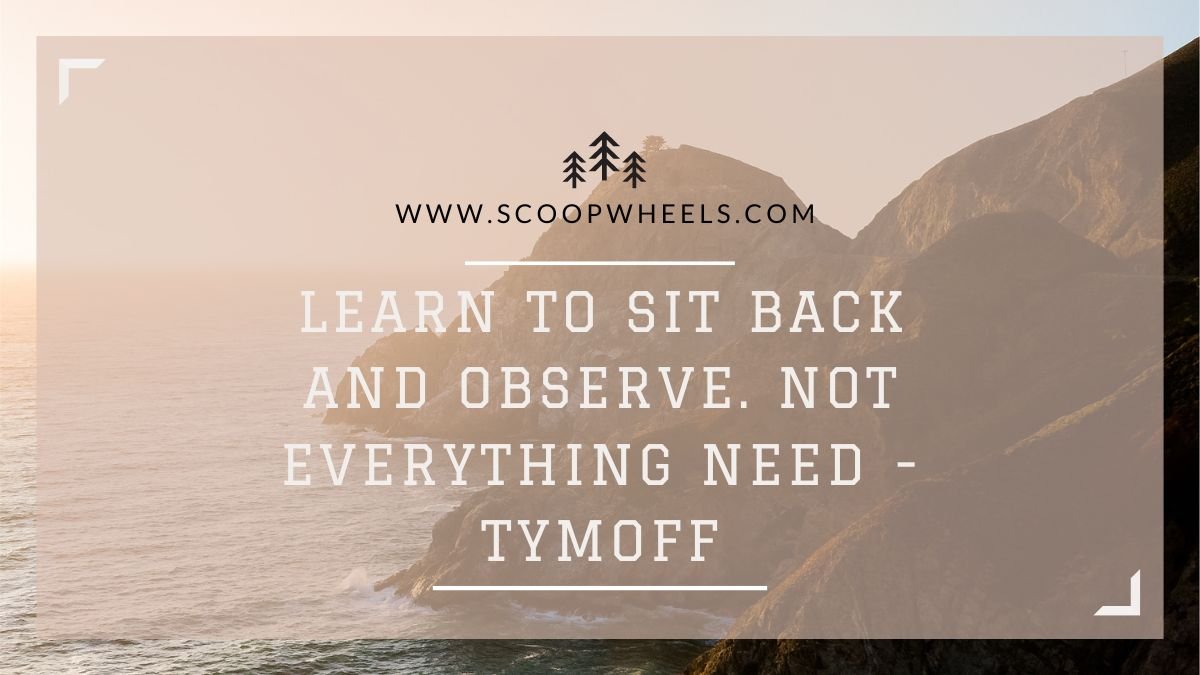The quote “learn to sit back and observe. not everything need – tymoff” is indispensable in the modern world as we get overwhelmed with the information and have to learn to take a break and analyze things without having an immediate response. The truth in this profound proclamation embraces the virtue of conscious observation, which, in turn, serves to significantly shape the nature of interpersonal relationships, personal growth, and positive holistic health. In this article we are going to explore more about learn to sit back and observe. not everything need – tymoff.
The Essence of learn to sit back and observe
Observation here goes beyond just the act of looking at but the concept/process of getting involved in what is around and interacting with it. Thus, they suggested that better ways of facilitating cooperation can be identified by observing before intervening in order to respond more purposefully to the actions present. That is why this practice is effective as it changes the principles by which we can exist in this world: more focused and meaningful.
The Impact of Pausing
Learn to sit back and observe. not everything need – tymoff. Let me tell you, there is a lot to be gained from biting your tongue for a moment. In essence, it shows us that it is possible to step back with the goal of gaining insight into a particular process and thereby be able to come up with a constructive, and particularly effective means of handling it. It does so; through this mindful approach one can neutralize impulse behavior due to its emphasis on thoughtful reactions.
How the Quote Changed My Perspective
In this qoute learn to sit back and observe. not everything need – tymoff. As much as I am an observer, this practice has had a drastic impact on how I view relations and the development of the self. This I have learned patience and the value of silence; features that play a central role when it comes to handling various aspects in life.
The Significance of Silence
It may also be worth mentioning that sometimes, even when dealing with oral communication, it is possible not to utilize words very actively; still, one can be a good communicator. Asking the questions and/or reflecting on an answer means that we hold a space, in order to give life to the words that follow. This also helps us receive information that otherwise may go unheard and also time to think about the answer rather than actually responding. That has definitely reshaped the way I engage with people, for it has become much more significant as well as productive.
Regulating Emotions
Emotions can be effectively managed through awareness so that the appropriate action is taken regarding any thought that passes through the mind. In terms of thinking about our emotions, distancing helps individuals manage omnipresent tensions and emotions in their day-to-day lives. It can help in managing situations in a logical manner rather than in a hasty way simply because someone has provoked us.
Enhancing Relationships
An article will explain that simply observing can improve our relationships considerably. Thus, they are entered into the list of social skills that have to do with the ability of attending to other people’s behaviour and mood. This practice enhances friendship bonds and the overall interaction between people, hence increasing the harmonious interaction of individuals.
Professional Growth
In the professional context these skills are rather useful: the ability to sit back and wait before one proceeds or answers. They enable us to have an overview of what is happening, to gain knowledge and make appropriate decisions, and foster sound interpersonal relationships with sub-ordinates. This has a positive impact on our goals in that it may be a good approach to attaining better and more satisfying career/job outcomes.
Travel and Cultural Understanding
Observation is one of the most pertinent experiences one can choose in the course of interpersonal communication: traveling is a great opportunity for that. Cruises that involve interaction with people of different cultures, and learning of their customs, and ways of living is another great way of understanding diversity. It makes our travelling experiences more enjoyable and diverse as we get to learn more about the world we live in.
Learning Through Observation
It is very important that observation should be initiated as contending that observation forms an important part of learning. Closely reading the material contents along with the identification of the dynamics within the learning environment allows for amplification of the knowledge being interment. This approach brings learning to life and makes it more of a collective process by making it engaging rather than just a routine.
Developing Hobbies and Interests
It helps with observation even in such aspects of life as hobbies and interests therefore improving our experience. As with painting or gardening or any other activity one can focus more on offers can enhance the value as well as the quality of the talent. This deliberate strategy brings so much positive impact to our pastimes that make them more satisfying and rewarding.
Problem-Solving Through Observation
As one would know, the first step in most problem solving is diagnosis or observation. In my opinion, it seems that by investing additional time and effort into truly understanding the nature of a challenge, one is better prepared to think in the practical terms about the problem without reaching an immediate solution. They bring contemplative thinking and can help to achieve even higher results, which will be more permanent in nature.
Analysis of managerial data
There are many examples of successful people who have mastered the visual arts. Learn to sit back and watch: Not everything needs a reaction. For example, famous detectives like Sherlock Holmes in fiction or real-life figures like Steve Jobs emphasize the importance of management in their work
These case studies show how supervision can lead to innovative solutions and unique achievements. Warren Buffett was one of the most successful investors and known for his patience. He spends a lot of time reading and researching before making financial decisions, which shows the power of knowledge observation.
Practical Tips for Observational Living

1. Embrace Mindful Living
This means that the key to observational living, which is the way of life in an observatory, hinges on mindfulness. In this way, we aren’t simply observing but can actually purposefully observe, because being present engulfs observation as one of its key facets. It also aids in avoiding negative habits since this approach assists in changing our interactions with time.
2. Journaling as a Reflective Practice
Recording your thoughts and emotions can be a very effective way of doing this. Freewriting is a way of collecting a scholar’s observations as well as their thoughts about a particular subject. It has the effect of frequently reminding the student of the significance of mindfulness and specific observation.
3. Active Listening
Observation even implies the listening process in social interaction. The post shows how if one takes the time to actively listen this help to improve his or her understanding as well as the relationships between people. This is good for the relationship as it assists in communication and fosters trust.
4. Reflective Practices
Reflection is therefore useful in ‘away’ events to make sure we assimilate what we see and use it in our respective lives. This way, we can easily analyze our events in life and acquire more insights regarding our growth and development not only personally but professionally as well.
5. Mindfulness Meditation
I also learned from Practicing mindfulness meditation, that being present and not getting provoked is an important virtue. Thus, it is possible to reserve time for certain intervals of contemplative silence in order to regulate it in our heads and think thoroughly. It is highly effective in enhancing the quality of relationships we have, and hence our overall health.
Societal Implications of Observational Wisdom
1. Inspiring Others
Hamlet’s act of living by the principles of observation can instill spirits on those who are surrounding him. In other words, they teach other people how to behave and act in a correct manner as the result of the actions of the people who are around them.
2. Creating Positive Change
Attention to observation’s abilities to bring about change shows that they are constructive in playing out change in various communities. If we strive understanding the needs and interactions within our managed society, then we will be more equipped in contributing towards the improved formation of an intensively compassionate society.
Examples from My Life
1. Insights from Team Meetings
The act of observing has allowed me acknowledge the potential approaches other groups may employ during group sessions if faced with a similar problem.
2. Handling Unexpected News
Interpreting things in my favor and using opportunity has made it easier to handle unexpected news than become overwhelmed or agitated by them.
3. Managing Criticism
Thus, having learned to listen to the feedback more keenly and assimilate criticism, I have effectively incorporated the use of criticisms as a tool for personal development.
4. Navigating Office Dynamics
In my real-life experience, observation has assisted me in managing intricate working relations within the office and make appropriate choices that can foster an appropriate climate within the workplace.
5. Resolving Personal Conflicts
Real-life situations and management of interpersonal conflicts have made me be in a position to embrace and understand the characteristics of conflicts and respond in the right manner.
Conclusion
The quote that is used here “learn to sit back and observe. not everything need – tymoff” helps in being mindful of the fact that sometimes, it is necessary to just watch without responding. In other words, through these principles, we can live to see the light and incorporate them in order to have meaning in life. Such an approach improves our lives and therefore our character as well and also works towards making society a greater place.
FAQs on learn to sit back and observe. not everything need – tymoff
The quote encourages mindfulness and patience. It suggests that not every situation or statement requires an immediate response. By observing and understanding before reacting, we can make more thoughtful and effective decisions.
By observing rather than reacting impulsively, you can better understand others’ perspectives and emotions. This enhances empathy, improves communication, and fosters deeper, more meaningful connections.
In professional environments, observing allows you to understand the dynamics and gather necessary information before making decisions. This can lead to more strategic thinking, better problem-solving, and stronger workplace relationships.
Yes, observation is a key component of personal development. It helps you become more self-aware, manage your emotions effectively, and respond to challenges thoughtfully. This mindful approach can lead to continuous growth and improvement.
You can start by being present and mindful in your daily activities. Practice active listening, take deliberate pauses before responding.



